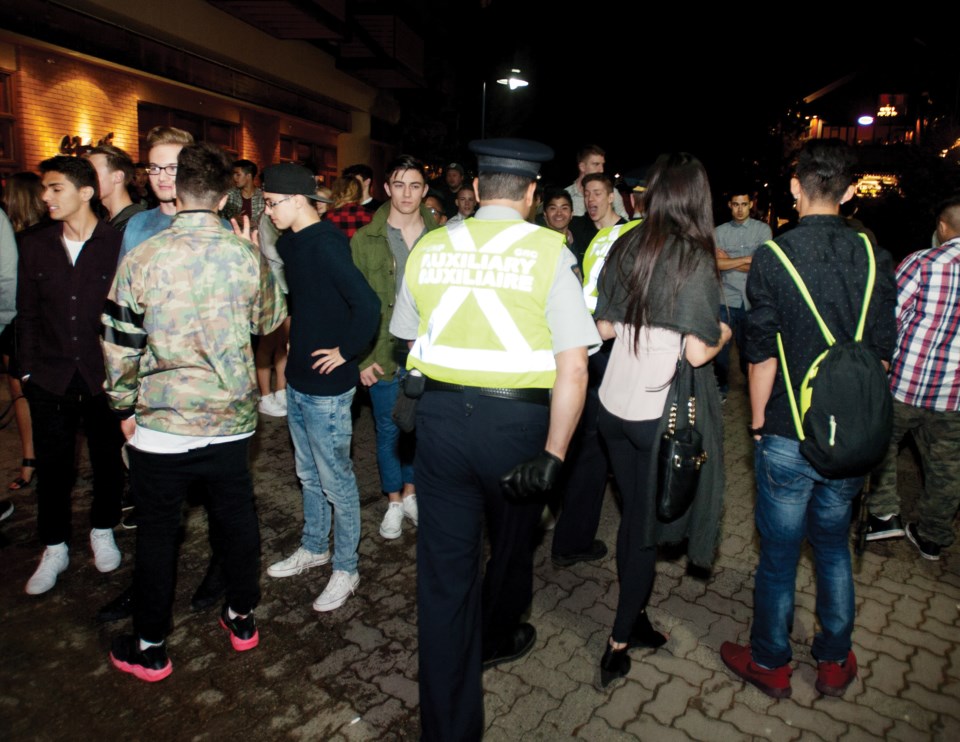The Whistler RCMP is in discussions with local government and the resort’s largest hospitality group to introduce an inadmissible patron and bar watch program aimed at keeping known gang members out of resort establishments.
Modelled after similar programs in Vancouver and Surrey and developed with guidance from B.C.’s Combined Forces Special Enforcement Unit and the Surrey Gang Enforcement Team, the initiative would see police working with participating venues to identify gang members and remove them from the premises, a response to the rising tide of brazen gang violence seen this year in the Lower Mainland.
“It goes in ebbs and waves, but particularly over the last six months in the Lower Mainland, with the increase in homicides that they had in the May-June-early-July period, there were some concerns from the RMOW [Resort Municipality of Whistler], justifiably so, about whether or not that would flow into the Whistler area,” said Sea to Sky North Zone commander Sgt. Sascha Banks. “How do we keep the members and visitors of our community as safe as we possibly can? This program just seemed to be the next segue to ensure we can do that in Whistler.”
Hopeful for launch by the winter season, Banks said police have been in talks with the RMOW and the Gibbons Hospitality Group, operators of seven resort pubs, clubs and restaurants. (A representative for Gibbons could not be reached by press time.)
Banks noted gang members have been documented coming to Whistler “for a long time,” commonly as tourists.
“They come up, stay at the hotels and eat at our restaurants. That’s just something we’re aware of and we can’t be in a position of not doing anything about it anymore,” she said.
While Mounties haven’t noted an increase in reported crime when gang members have been in the community of late, Banks said there is a need for deeper intelligence.
“I wouldn’t necessarily say it would be an uptick in crimes that are being reported to police, but are there things going on that we may not be aware of? Or are there risks to the public that we just can’t do something about? I would say 100 per cent,” she added.
In 2006, the Respect Whistler Coordinating Committee, a precursor to the RMOW’s May Long Weekend Committee created seven years ago, was formed after a particularly rowdy May long weekend. Still meeting today, the May Long Weekend Committee’s goal was to transform a holiday that had historically been popular with Lower Mainland gang members and associates. That led to an increased police presence and family-friendly programming being developed, like the Great Outdoors Festival, which in the intervening years has mostly mellowed the holiday weekend.
“That’s what the strategy of the May Long Weekend Committee was originally: we want them to not feel comfortable here,” said Ralph Forsyth, council’s appointee to the committee. “If you have things that are family-oriented, then they’re not comfortable. They’re criminals; they want seedy activity and the more you can get rid of that, the better.”
The Vancouver Police Department (VPD) has two parallel programs, Bar Watch and Restaurant Watch, and the more than 189 participating venues sign an agreement allowing police to act on behalf of owners to deny service to anyone whose “lifestyle choices jeopardize the safety of patrons, staff and the general public,” wrote Restaurant Watch coordinator Cst. Brian Chernoff in an email.
VPD’s gang unit conducts daily patrols for inadmissible patrons at partner venues, and is responsible for identifying and removing gang members based on a strict list of criteria.
In Whistler, officers will patrol partner establishments during peak periods, not daily, and while there is no expectation on staff to identify inadmissible patrons, if a known gang member is present, they can call the detachment for officers to attend.
In a 2013 graduate thesis examining Vancouver’s Restaurant Watch program, Kwantlen Polytechnic University criminology major Shaveta Gahenia noted how business owners roundly felt it had positively affected their organizations and effectively deterred gang members from attending their establishments.
The programs have not been without controversy, however. The Office of the Police Complaints Commissioner has emphasized that the programs place officers “in a conflict of interest whereby they are simultaneously acting as private citizens and peace officers,” as well as concerns over police accountability, while the B.C. Civil Liberties Association has criticized the programs over the wide level of discretion they give officers in banning patrons, as well as a lack of concrete data on their effectiveness.
Whistler RCMP said the program is in the approval stages and final details will be ironed out as the detachment continues to discuss the initiative with the community and prepares to roll it out.




